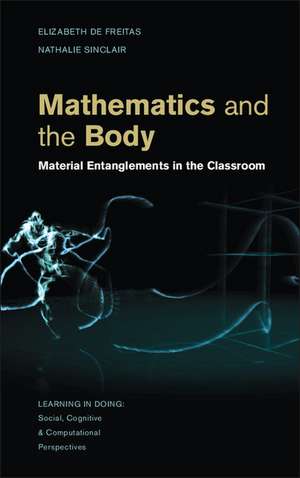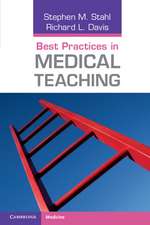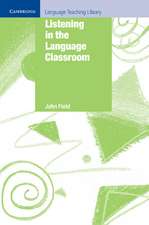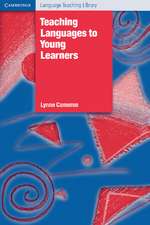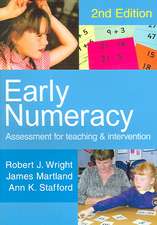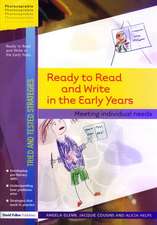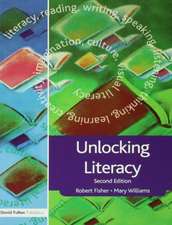Mathematics and the Body: Material Entanglements in the Classroom: Learning in Doing: Social, Cognitive and Computational Perspectives
Autor Elizabeth de Freitas, Nathalie Sinclairen Limba Engleză Hardback – iun 2014
Din seria Learning in Doing: Social, Cognitive and Computational Perspectives
-
 Preț: 311.66 lei
Preț: 311.66 lei - 9%
 Preț: 695.96 lei
Preț: 695.96 lei -
 Preț: 319.43 lei
Preț: 319.43 lei -
 Preț: 228.66 lei
Preț: 228.66 lei -
 Preț: 201.39 lei
Preț: 201.39 lei - 11%
 Preț: 493.04 lei
Preț: 493.04 lei -
 Preț: 281.88 lei
Preț: 281.88 lei -
 Preț: 431.40 lei
Preț: 431.40 lei - 14%
 Preț: 900.82 lei
Preț: 900.82 lei -
 Preț: 326.53 lei
Preț: 326.53 lei -
 Preț: 346.50 lei
Preț: 346.50 lei -
 Preț: 296.65 lei
Preț: 296.65 lei -
 Preț: 292.45 lei
Preț: 292.45 lei - 20%
 Preț: 279.91 lei
Preț: 279.91 lei - 11%
 Preț: 459.10 lei
Preț: 459.10 lei -
 Preț: 357.13 lei
Preț: 357.13 lei - 11%
 Preț: 526.58 lei
Preț: 526.58 lei - 14%
 Preț: 784.65 lei
Preț: 784.65 lei -
 Preț: 320.66 lei
Preț: 320.66 lei - 11%
 Preț: 512.98 lei
Preț: 512.98 lei -
 Preț: 332.97 lei
Preț: 332.97 lei - 11%
 Preț: 690.80 lei
Preț: 690.80 lei - 11%
 Preț: 444.70 lei
Preț: 444.70 lei -
 Preț: 324.15 lei
Preț: 324.15 lei -
 Preț: 350.97 lei
Preț: 350.97 lei -
 Preț: 392.00 lei
Preț: 392.00 lei - 20%
 Preț: 516.51 lei
Preț: 516.51 lei -
 Preț: 330.33 lei
Preț: 330.33 lei - 14%
 Preț: 786.15 lei
Preț: 786.15 lei - 5%
 Preț: 321.87 lei
Preț: 321.87 lei -
 Preț: 350.21 lei
Preț: 350.21 lei -
 Preț: 321.27 lei
Preț: 321.27 lei - 14%
 Preț: 726.60 lei
Preț: 726.60 lei -
 Preț: 339.96 lei
Preț: 339.96 lei
Preț: 723.92 lei
Preț vechi: 841.77 lei
-14% Nou
Puncte Express: 1086
Preț estimativ în valută:
138.54€ • 143.76$ • 115.79£
138.54€ • 143.76$ • 115.79£
Carte tipărită la comandă
Livrare economică 17-31 martie
Preluare comenzi: 021 569.72.76
Specificații
ISBN-13: 9781107039483
ISBN-10: 1107039487
Pagini: 284
Ilustrații: 65 b/w illus. 2 tables
Dimensiuni: 157 x 235 x 19 mm
Greutate: 0.5 kg
Ediția:New.
Editura: Cambridge University Press
Colecția Cambridge University Press
Seria Learning in Doing: Social, Cognitive and Computational Perspectives
Locul publicării:New York, United States
ISBN-10: 1107039487
Pagini: 284
Ilustrații: 65 b/w illus. 2 tables
Dimensiuni: 157 x 235 x 19 mm
Greutate: 0.5 kg
Ediția:New.
Editura: Cambridge University Press
Colecția Cambridge University Press
Seria Learning in Doing: Social, Cognitive and Computational Perspectives
Locul publicării:New York, United States
Cuprins
Introduction; 1. When does a body become a body?; 2. The 'ontological turn' of inclusive materialism; 3. Diagrams, gestures, movement; 4. Inventiveness in the mathematics classroom; 5. Materialist approaches to mathematics classroom discourse; 6. The sensory politics of the body mathematical; 7. Mapping the cultural formation of the mathematical aesthetic; 8. The virtuality of mathematical concepts; Conclusion.
Recenzii
'This book is a fabulous and timely contribution. It is a much-needed and radical critique of current embodied approaches within mathematics education, arguing that such approaches have, in large part, retained the very splits (inner/outer, individual/social) that they hoped to overcome. The scholarship is excellent and the writing is clear and concise.' Alf Coles, University of Bristol
'This book is challenging and bracingly intellectual, in a field that has not always been so orientated. But it is not only theoretical and sophisticated about its ideas; it is also intellectual and academic in the best sense about practical contexts of mathematics schooling and what I might term 'everyday' phenomena of educational interest.' David Pimm, University of Alberta
'The sense of timing for this work is finely tuned, because some of us have been thinking that too often in mathematics education, in particular, we have been asking the wrong questions in the wrong way. The authors' response is through a different 'conceptual space'. Rather than invoking a sociocultural, linguistic, or sociopolitical turn, the authors' specific approach is to explore the 'material'. It is an approach that invites dialogue from which new knowledge can be built.' Margaret Walshaw, Massey University
'This book is challenging and bracingly intellectual, in a field that has not always been so orientated. But it is not only theoretical and sophisticated about its ideas; it is also intellectual and academic in the best sense about practical contexts of mathematics schooling and what I might term 'everyday' phenomena of educational interest.' David Pimm, University of Alberta
'The sense of timing for this work is finely tuned, because some of us have been thinking that too often in mathematics education, in particular, we have been asking the wrong questions in the wrong way. The authors' response is through a different 'conceptual space'. Rather than invoking a sociocultural, linguistic, or sociopolitical turn, the authors' specific approach is to explore the 'material'. It is an approach that invites dialogue from which new knowledge can be built.' Margaret Walshaw, Massey University
Notă biografică
Descriere
This book expands the landscape of research in mathematics education by analyzing how the body influences mathematical thinking.
